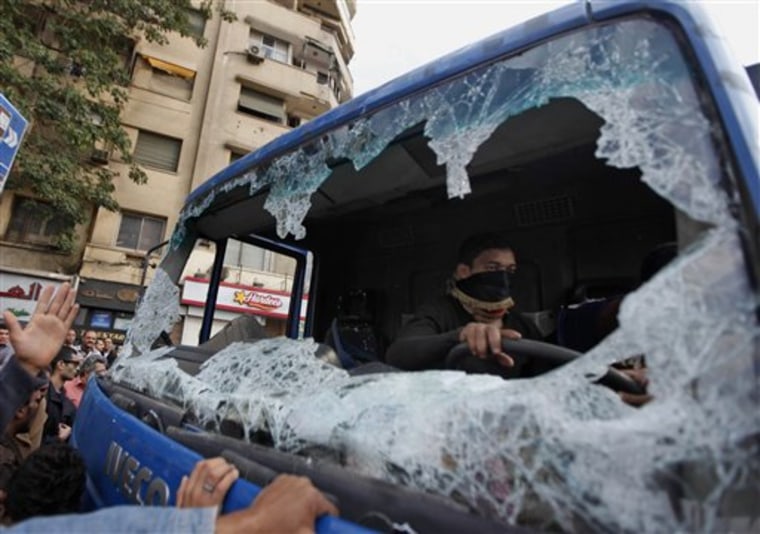Clashes erupted between protesters and police in Cairo and two other Egyptian cities, killing two people and wounding hundreds in the biggest security challenge yet for the country's ruling generals days before scheduled elections.
In scenes reminiscent of the 18-day uprising that toppled Hosni Mubarak from three decades of power in February, hundreds of youths chanted "The people want to topple the regime" on Saturday as they rushed towards riot police, who fired rubber bullets and tear gas.
Protesters broke chunks of cement from pavements and hurled them at police in clashes in which police lost control of Cairo's landmark Tahrir Square twice in the day.
A blaze broke out around midnight at the huge Mogamma state administration building overlooking Tahrir.
As police fired round after round of tear gas at protesters near the interior ministry, closer to Tahrir protesters laid sheets of metal to block roads into the square.
"They unleashed 20 trucks to forcefully disperse a few dozen peaceful protesters this morning," Salah Saeed said as he handed out vinegar-doused napkins to protect protesters against the tear gas.
"Now thousands of Egyptians are protesting in Tahrir. We don't need the corrupt interior ministry or the military council," he said.
Staggered voting is due to begin on Nov. 28 but could be disrupted if violence spreads.
'Violence breeds violence'
Witnesses said the clashes began when riot police dismantled a small tent camp set up to commemorate the hundreds of protesters killed in the uprising and attacked around 200 peaceful demonstrators who had camped in the square overnight in an attempt to restart a long-term sit-in there.
"Violence breeds violence," said Sahar Abdel-Mohsen, an engineer who joined in the protest after a call went out on Twitter urging people to come to Tahrir to defend against the police attacks. "We are tired of this and we are not leaving the square."
One 23-year-old protester died from a gunshot, said Health Ministry official Mohammed el-Sherbeni. At least 676 people were injured, he said.
Crowds swarmed an armored police truck, rocking it back and forth and setting it ablaze.
After nightfall, protesters swarmed back into the square in the thousands, setting tires ablaze in the street and filling the area with an acrid, black smoke screen. Police appeared to retreat to surrounding areas, leaving protesters free to retake and barricade themselves inside the square. The air was still thick with stinging tear gas.
Prime Minister Essam Sharaf urged the protesters to clear the square.
"What is happening in Tahrir is very dangerous and threatens the course of the nation and the revolution," the Cabinet warned in a statement.
Saturday's confrontation was one of the few since the uprising to involve police forces, which have largely stayed in the background while the military takes charge of security. There was no military presence in and around the square on Saturday.
The black-clad police were a hated symbol of Mubarak's regime.
"The people want to topple the regime," shouted enraged crowds, reviving the chant from the early days of the uprising. Crowds also screamed: "Riot police are thugs and thieves" and "Down with the Marshal," referring to Field Marshal Hussein Tantawi, Egypt's military ruler.
Some of the wounded had blood streaming down their faces and many had to be carried out of the square by fellow protesters to waiting ambulances.
Human rights activists accused police of using excessive force.
One prominent activist, Malek Mostafa, lost his right eye from a rubber bullet, said Ghada Shahbender, a member of the Egyptian Organization for Human Rights.
'A crime'
At least four protesters were injured in the eyes as a result of what Shahbender said were orders to target protesters' heads.
"It is a crime," she said. "They were shooting rubber bullets directly at the heads. ... I heard an officer ordering his soldiers to aim for the head."
A videojournalist for the Egyptian newspaper Al-Masry al-Youm, Ahmed Abdel-Fatah, was also hit in the eye by a rubber bullet and was undergoing surgery.
Police arrested 18 people, state TV reported, describing the protesters as rioters.
Protests were also held Saturday in the Red Sea port city of Suez, where a crowd of thousands attacked a police station, with some hurling firebombs at the building, said protester Ahmed Khafagi.
In Alexandria, hundreds of people threw stones at the main security headquarters, said protester Ahmed Abdel-Qader. He said it felt like the revolution was starting all over again.
"We only managed to bring down the head of the regime. The rest of the tree is still standing," he said.
A day earlier, tens of thousands of Islamists and young activists had massed in Tahrir Square to protest Egypt's ruling military council, which took control of the country after Mubarak's ouster and has been harshly criticized for its oversight of the bumpy transition period.

Friday's crowd, the largest in months, was mobilized by the Muslim Brotherhood and focused its anger on a document drafted by the military that spells out guiding principles for a new constitution.
Under those guidelines, the military and its budget would be shielded from civilian oversight. An early version of it also said the military would appoint 80 members of the 100-person constitutional committee — a move that would vastly diminish the new parliament's role.